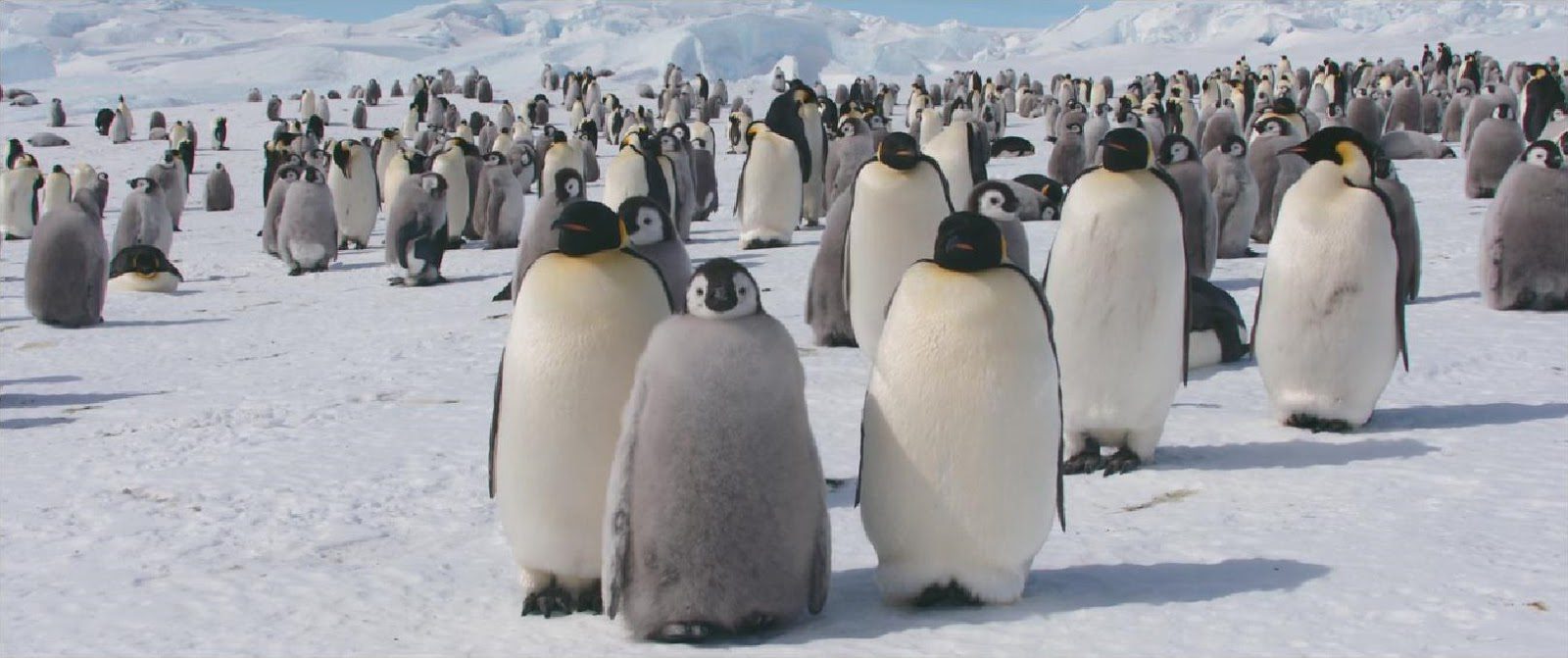When March of the Penguins first came out in 2005, my children were still just dreams my husband and I hoped to have one day. From very early on, I knew I wanted to be a mom. It never occurred to me that trying to have children might not work out. By 2005, we had already had two miscarriages, which had rocked our faith and understanding of God’s promises to us.
Would we be granted the desires of our hearts, I wondered? (Okay, I raged. “Wonder” is what you do about what you plan to eat for lunch.) Together in our separate grief, we suffered forward, trying again when it was safe to. When my dream was finally realized, it became clear to us just how true it is that every birth is a miracle and every life is sacred.
March of the Penguins: What to Expect
March of the Penguins is all about the struggles and sacrifices it takes for a family—specifically the emperor penguin family—to be born and survive. Directed by Luc Jaquet, the documentary follows the back-and-forth journey emperor penguins take across the continent of Antarctica to protect and provide for their young.
Available for rent on Amazon, March of the Penguins is a great choice for your family, and not just because Morgan Freeman is the narrator. Just like every family, emperor penguins struggle with failure, loss, hunger, jealousy, and threats to their safety. Emperor penguins strive to survive through sacrifice, care, patience, community, and love.
One of the most beautiful and inspiring aspects of the emperor penguin’s life is the way that parents share the burden of caring for their young. As soon as the female emperor penguin lays its egg, she passes the egg to her mate, who must protect it for two months, going without food while the female walks back to the ocean… a mere 70 miles away from the breeding ground.
Why do they travel all this way? To hatch their young away from predators, where the ice is thickest, protecting their young. The two love birds take turns making the trek across the ice to fish, bringing back food.
Finding the Love: Faithifying Your Viewing
Jesus revolutionized the human race in a hundred different ways, one of them being the way he welcomed women to be His disciples. God has been breaking down stereotypes for eons, including in the animal kingdom, where in many ways the male penguin is the nurturer, the caretaker. God has a way of helping each of us live out our uniquely God-given strengths even if they defy society norms, doesn’t He?
Together, the male penguins endure 80 degrees below zero temperatures and winds over 100 mph, all without food for 125 days. The penguins take turns spending time in the center of the huddle where it’s warmer and act together as a united front. This is not about who is first, who is the most powerful, or who wins the woman; this is about ensuring their combined survival. Suffering brings that out in the body of Christ, too; it’s love that binds us together, the love of God that commands us to love one another as Christ loved us and gave Himself for us. As long as we continue to walk in the way of love, we will be like the emperor penguins. We will stand together, protect one another, and survive.
The fathers go four months without eating. Just as the egg hatches and before the mother returns, “The father coughs up a milky substance relegated just for this moment. This will keep the chick alive for just another day or two until the mother arrives.” As this happens, I remember God’s provision, see it built into the penguin, that what is needed is given, like manna in the wilderness, bread of life, just enough to sustain us.
I love how intimately the penguins know their loved ones. Jesus said in John 10:27, “My sheep listen to my voice; I know them, and they follow me.” As soon as the mother returns from her hunt, she sings for her mate, and he sings back. Above the cacophony of voices, they find each other. Now, the father must leave to find food himself, but not before listening to his chick’s song. When he returns from his 140-mile-long hike round trip, the father is able to find his chick because he remembers the sound of its voice.
When a mother’s young one doesn’t make it, Morgan Freeman tells us, “Every year some bereft mother will respond to her agony in an unimaginable way – she will attempt to steal another. But the group will not allow it.” We witness the power of the body of Christ to rescue the weak and oppressed as the penguins defend their young from her. And there, too, we see reflected in the penguin mother our own lament and out-of-our-minds anguish at what could have been, now broken. The penguin grieves, the way God must grieve over every lost one, the way God must mourn with the mourning.
As the penguins march across the ice, Morgan Freeman declares, “Maybe they are guided by some invisible compass within them,” and I hear the prophet Isaiah declare, “Whether you turn to the right or to the left, your ears will hear a voice behind you, saying, ‘This is the way; walk in it.’” God sets eternity in our hearts. We are drawn forward, left, or right, by design, into the future, forward into the next generation. “For four years the chicks will live at sea. At their fifth year, they will climb out of the water and march just like their parents.”
It takes so much to bring new life into the world. Even when they’re born safely, it takes even more to keep them well and help them thrive. March of the Penguins reminds us of the power love and community have to bind us together for our survival. May we, as another species in the animal kingdom listen, reflect, and remember.





 Copyright
2024
Root and Vine
Copyright
2024
Root and Vine